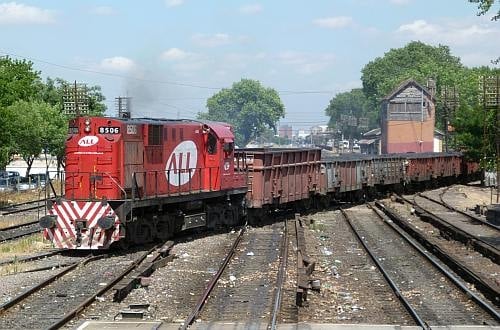Rumo ALL is aiming for improved efficiency and to increase the volumes of grain, sugar and the other commodities it transports through four railway concessions covering 12,900km of track in the south of Brazil. It expects to invest Reais 7.4bn ($US 2.48bn) up to 2019 excluding current investments in two phases.
Phase one encompasses Reais 2.8bn in investments aimed at improving efficiency and reducing operating costs up to the end of 2016. This will include replacing locomotives, wagons and restoring infrastructure, with some measures that have already been adopted resulting in reductions in journey times. Rumo ALL estimates that these measures could increase Ebitda by up to Reais 500m by the end of 2016, with 2015 Ebitda estimated at Reais 1.6-2bn.
An additional Reais 4.8bn will be spent from 2017 to 2019 on similar improvements. However, this figure will depend on renewal of three concessions by the National Land Transport Agency (ANTT). If it does not secure these concessions, as a back-up plan, Rumo ALL plans to add extra capacity to its northern network for which it holds a concession up to 2078.
In its five year plan, Rumo ALL forecasts growing Ebitda by Reais 1.1bn up to 2019 compared with Reais 3.3-3.5bn in 2016. This will translate to an increase in the volumes of grain transported from 22 million tonnes in 2014 to 39 million tonnes in 2025. Forecasts of growth for sugar are even greater; 6.4 million tonnes in 2014 to 20 million tonnes in 2025.
Approximately 2600km, or 22%, of Rumo ALL's network is considered high-density and is consequently the backbone of the company's financial performance. Up to 45% of the network is considered low density, with assessments of these sections' economic viability and volume potential now underway. Around one-third of the network is considered uneconomical with little prospect for growth.
"We see a great growth opportunity in the sugar market, which will only be possible if we're able to increase capacity," says Mr Júlio Fontana, president of Rumo ALL. "That's why we're working to increase capacity, remove restrictions and bottlenecks, and improve access to the port of Santos."
Rumo ALL has already secured 50% of the financing for the first phase of its investment plan, with the remainder expected to come from Brazil's National Bank for Economic and Social Development (BNDES), credit agencies and the financing arm of the Central-West Region (FCO). The majority of the remaining investments up to 2019 will be provided from BNDES and 23% from other market sources, with all investments funded through loans.
Rumo ALL expects to generate positive cash-flow from 2017 onwards, with volumes increasing 8% to 48-50 billion tonne-km up to 2019, and reaching between 64 and 66 billion tonne-km in 2019.

